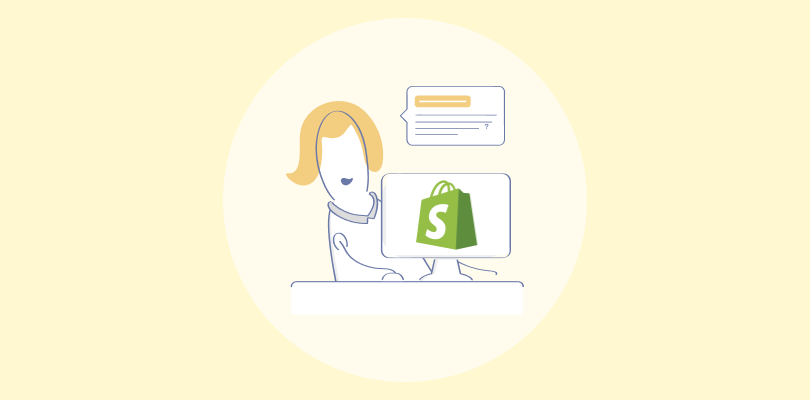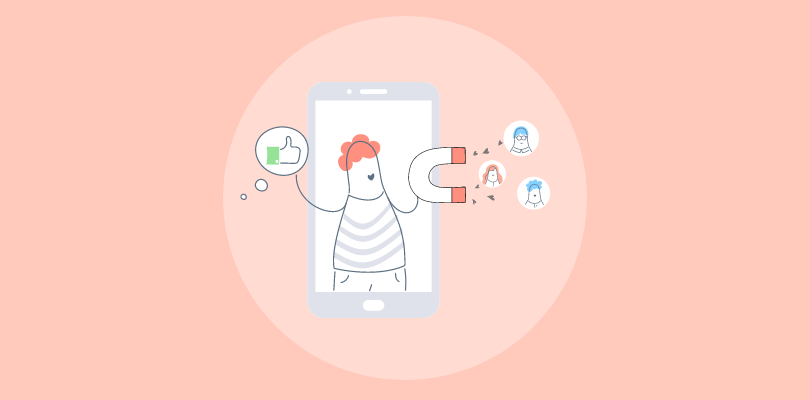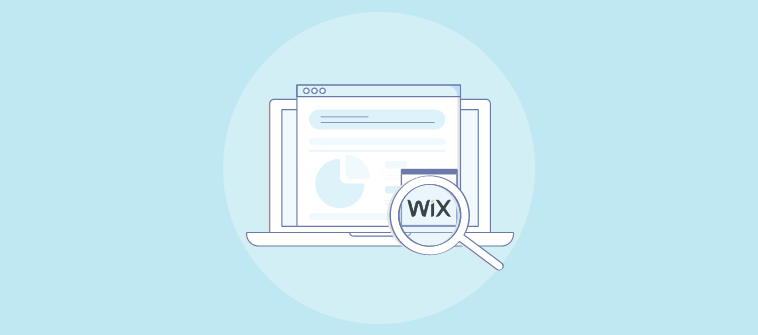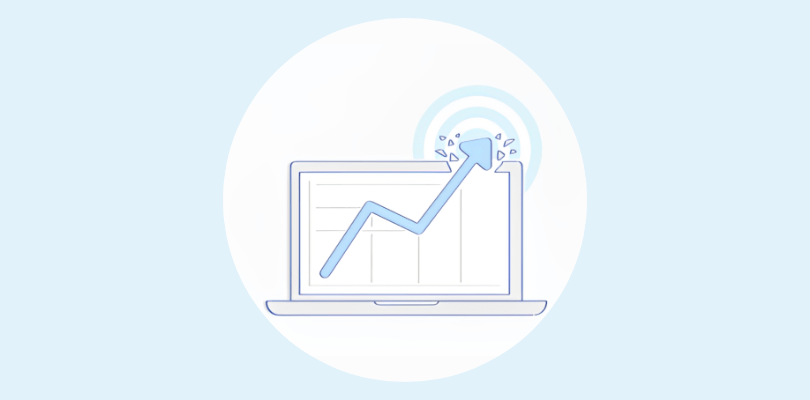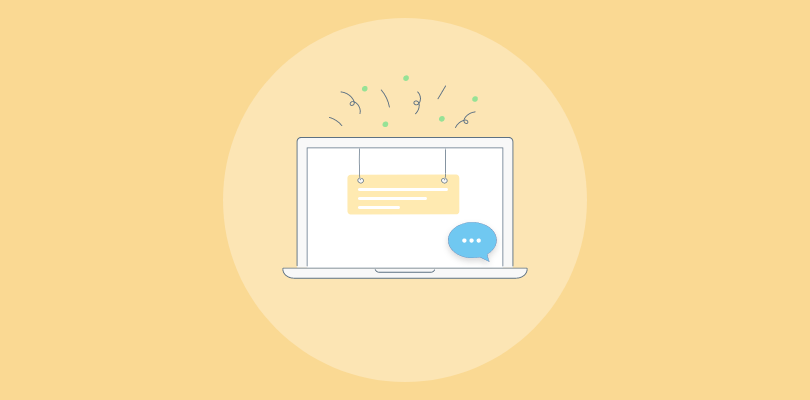Behind every successful business is great customer service, but trying to handle it all manually can be exhausting. Juggling countless inquiries, long response times, and inconsistent support often leads to frustrated customers and overwhelmed teams.
Here comes customer service automation software—the ultimate solution for streamlining support operations, improving response times, and providing a better overall customer experience.
In this blog, I’ll share the top 20 customer service automation tools that can positively impact the lives of your agents and customers. So, let’s get started!
What is Customer Service Automation Software?
Customer service automation software is a tool designed to streamline and automate interactions between businesses and their customers. It includes features like chatbots and self-service portals to handle customer inquiries quickly and efficiently. This software aims to improve response times and reduce workload pressures on customer service teams.
These tools often integrate with existing systems like CRM software and help desks, ensuring seamless communication across multiple channels. Automation software includes AI-driven features that analyze customer data and behavior, enabling personalized interactions and proactive support.
Using customer service automation software, businesses can provide 24/7 support, maintain consistent service quality, and improve overall customer satisfaction. This approach boosts efficiency while allowing agents to focus on complex issues.
Top 20 Customer Service Automation Software for Your Business
With the right customer service automation software, businesses can boost efficiency and provide seamless support. Here are the top 20 tools that can transform your customer service operations:
| Tool Name | Best For | Pricing | G2 Ratings |
|---|---|---|---|
| ProProfs Chat | 24/7 Delightful Customer Support With AI Chatbots | A Forever Free plan with all premium features is available for small teams. Paid plan starts from $19.99/user/month | 4.5/5 |
| ProProfs Help Desk | AI Help Desk & Support Ticketing for Customer Delight | FREE for a single user. Plans start at $19.99/user/month for 2 or more users | 4.7/5 |
| Proprofs Knowledge Base | Easily Creating Help Sites, Manuals & Private Knowledge Bases | Forever Free Plan with all the premium features for small teams. Paid plan starts at $49/author/month | 4.6/5 |
| BigContacts CRM | Contact Management & Email Marketing for Startups & Small & Medium Businesses | Forever free for small teams. Paid starts at $9.99/month | 4.5/5 |
| Tidio | Live Chat With Ticketing Functionality | Starts at $29/ month | 4.3/5 |
| Zendesk | Zendesk Users | Starts at $19/agent/month. | 4.3/5 |
| Intercom | Omnichannel Platform With Messenger & App | Starts at $29/seat/month | 4.5/5 |
| Live Agent | Ticket Management | Starts at $15/agent/month | 4.5/5 |
| Issuetrak | Issue Tracking and Management | Starts $26/agent/month | 4.1/5 |
| NinjaOne | AI-Powered Automation and Remote Monitoring | Contact the sales team | 4.7/5 |
| Stonly | AI-Powered Guided Support | Contact the sales team | 4.8/5 |
| Front | AI-powered Inbox Management | Starts at $19/seat/month | 4.7/5 |
| Kommunicate | AI-powered Chatbots | Starts at $100/month | 4.8/5 |
| BotsCrew | Seamless Multi-channel Customer Service | Contact the sales team | 4/5 |
| Zoho Desk | Zoho Suite Users | Starts at $7/month | 4.4/5 |
| SleekFlow | Integrated Messaging | Starts at $146.90/month | 4.6/5 |
| Kayako | Help Desk Integration | Starts at $49/month | 4.0/5 |
| RingCentral | Smart Call Routing & Transcription | Contact the sales team | 4.0/5 |
| Trengo | AI-powered Messaging Automation | Starts at 129.67/month | 4.3/5 |
| Comm100 | Omnichannel Customer Communication | Starts at $31/ agent/month | 4.2/5 |
1. ProProfs Chat
Best for 24/7 Delightful Customer Support With AI Chatbots
I’ve got to say ProProfs Chat has been a fantastic choice for automating customer service. The AI chatbot is quick and smart—handling queries in seconds and learning from the knowledge base and website data for smarter interactions. Canned responses make replying effortless, and online visitor tracking gives me a clear view of customer behavior.
The built-in reports and analytics offer useful insights, and integrations with other tools keep everything running smoothly. With chat support in 70+ languages and SSL encryption, it ensures a secure and seamless experience. Reliable, efficient, and adaptable—ProProfs Chat truly fits all my support needs.
Pros:
- Online visitor tracking to monitor and analyze customer behavior
- AI-powered chatbot to instantly handle queries 24/7
- Canned responses to faster replies with pre-set answers
- Automatic chat routing to direct queries to the correct department
Cons:
- Lacks an on-premise version
- Dark user interface option is not available
G2 Review:
“Personally, I like their clutter-free interface and those beautiful templates. We are currently using ProProfs chat for 3 operators and are quite satisfied with the customization features. Plus, it never gets sluggish on mobile devices, unlike others do.”
Pricing
A Forever Free plan with all premium features is available for small teams. Paid plan starts from $19.99/user/month.
2. ProProfs Help Desk
Best for AI Help Desk & Support Ticketing for Customer Delight
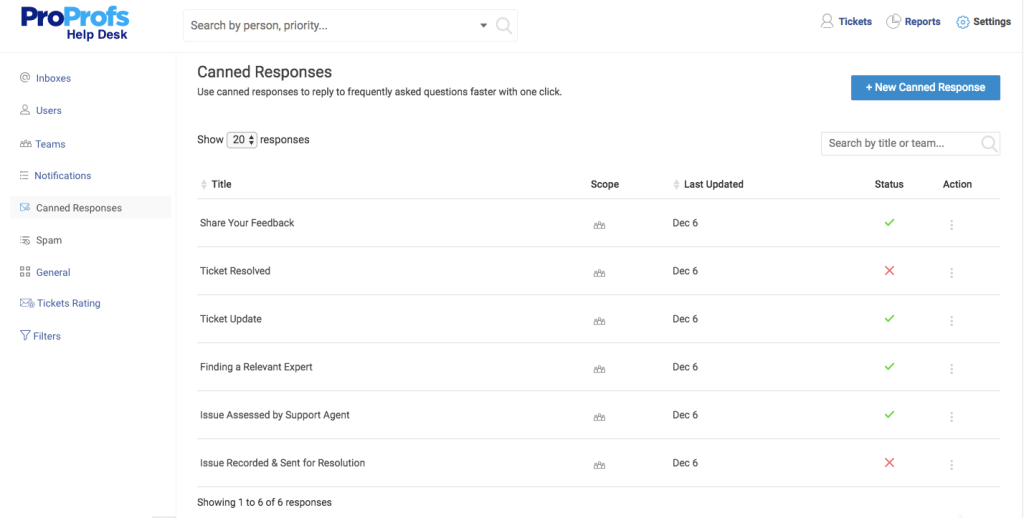
I’ve been using ProProfs Help Desk, and it’s been a robust help desk solution for managing support operations. The AI features like customer intent analysis, response suggestions, and automated ticket routing streamline everything effortlessly.
I love how the platform provides detailed reports and analytics, allowing me to track agent performance, ticket volume, and customer satisfaction with ease. It’s intuitive, efficient, and truly empowers our support team to deliver outstanding service.
Pros:
- Automated response suggestions to provide agents with pre-written replies
- Smart ticket routing to automatically assigns tickets to the right agent
- Ticket prioritization to identify urgent issues based on content analysis
- Automated ticket tagging to categorize tickets for easier management
Cons:
- There is no dark mode for the interface
- No downloadable or on-premise version
G2 Review:
“ProProfs Help Desk offers great features such as chatbots, ticket prioritization, shared inboxes, internal notes, reports, automated ticket assignment, and much more. In terms of features, this tool is a great bet.”
Pricing
FREE for a single user. Plans start at $19.99/user/month for 2 or more users.
3. ProProfs Knowledge Base
Best for Easily Creating Help Sites, Manuals & Private Knowledge Bases
ProProfs Knowledge Base is a robust customer service automation platform used to create clear, visually engaging, and error-free guides. I like its AI-powered WYSIWYG editor, which makes creating visually engaging, error-free guides easy. Plus, it features instant search, automated content suggestions, and white labeling, making it incredibly versatile.
Also, it seamlessly integrates with its sibling tools – ProProfs Help Desk and Live Chat – for a unified support experience. It’s a powerful tool for improving customer service efficiency.
Pros:
- Smart search to enable quick and accurate information retrieval
- Collaboration tools to facilitate teamwork with roles, permissions, and internal comments.
- Reports & analytics to measure knowledge base effectiveness
- WYSIWYG editor to help write articles quickly and efficiently
Cons:
- No downloadable or on-premise version
- Dark user interface option is not available
G2 Review:
“It has many functionalities including Google analytics integration, media files upload for customer FAQs, Chatbot, Live Chat, and customer insights and reports.”
Pricing
Forever Free Plan with all the premium features for small teams. Paid plan starts at $49/author/month.
4. BigContacts CRM
Best for Contact Management & Email Marketing for Startups & Small & Medium Businesses
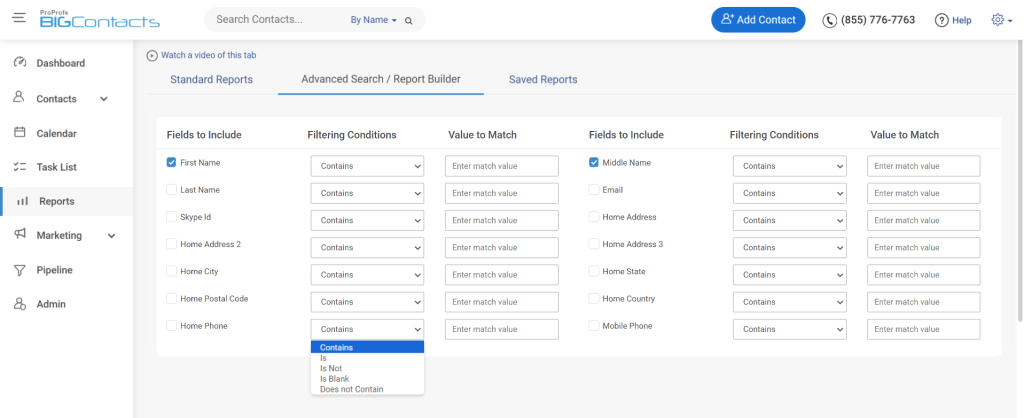
I found BigContacts to be a helpful tool for managing customer relationships and automating key tasks. Its AI-powered features, like automated email sequences and intelligent contact segmentation, saved me time and improved my overall efficiency.
I especially liked how it helped me personalize my communications and stay organized with reminders and follow-ups. BigContacts is a great option for businesses looking to streamline their customer service and build stronger relationships.
Pros:
- Automated email sequences to send personalized emails at the right time
- Intelligent contact segmentation to group contacts based on shared traits
- Task prioritization to highlight the most urgent tasks
- Lead scoring to prioritize leads based on engagement and potential value
Cons:
- No downloadable or on-premise version
- No dedicated account manager for the free plan, unlike the paid
G2 Review:
“BIGContacts helps us manage our sales opportunities using a visual pipeline. We can add custom stages to this pipeline and move the opportunities with a simple drag-and-drop interface. Sales reps can use this tool to set up alerts to engage with prospects and customers at the most appropriate time. The CRM application also helps us track sales performance with insightful reporting and analytics”.
Pricing
Forever free for small teams. Paid starts at $9.99/month.
5. Tidio
Best for Live Chat With Ticketing Functionality
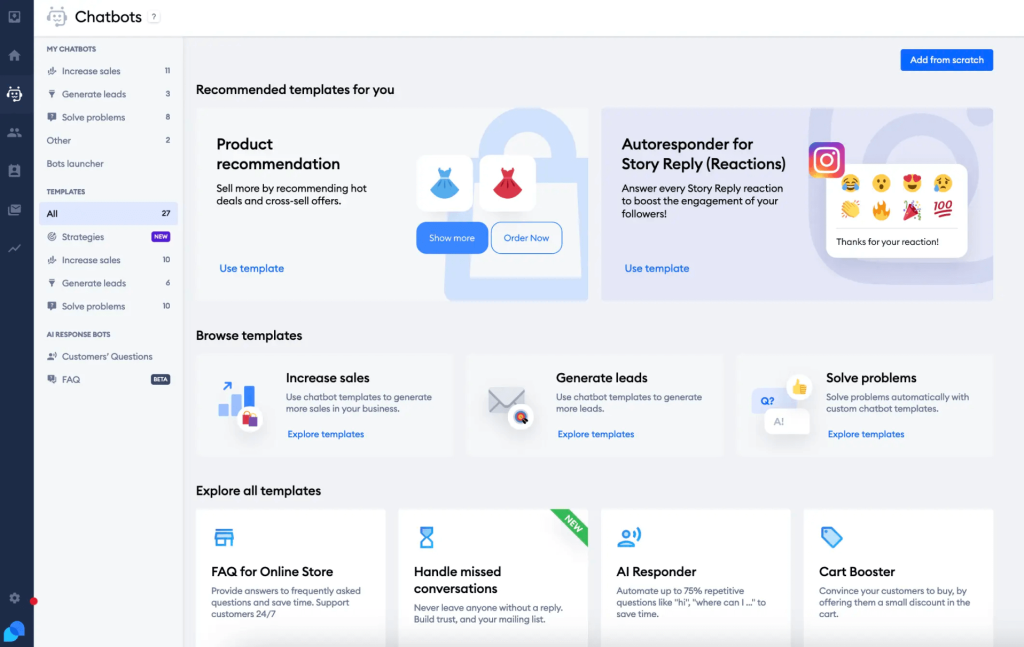
I used Tidio as my customer service automation tool, and it made a huge difference! Its AI chatbot, lyro, handled customer queries smoothly. The live chat feature was seamless, and the automation workflows were easy to set up. Tidio is ideal for live chat with ticketing functionality, offering seamless customer communication and easy support request management.
I appreciated the ready-to-use templates that saved time and effort. Its AI analytics also gave me useful insights into customer behavior, helping me improve support interactions. Overall, it was a reliable and efficient solution that made customer service much more manageable.
Pros:
- AI Analytics to track customer behavior and interaction patterns
- Canned responses to utilize pre-written replies for quick responses
- Integration with platforms like Messenger, Instagram, WhatsApp, and email
- Lyro AI Chatbot to automatically address customer inquiries using advanced AI technology
Cons:
- May take time for new users to get used to
- Lacks direct phone support for customers
G2 Review:
“Lyro AI is such a good thing to respond to customers while you are away.”
Pricing
Starts at $29/ month.
Also Read : Top 11 Tidio Live Chat Alternatives & Competitors
6. Zendesk
Best for Zendesk Users
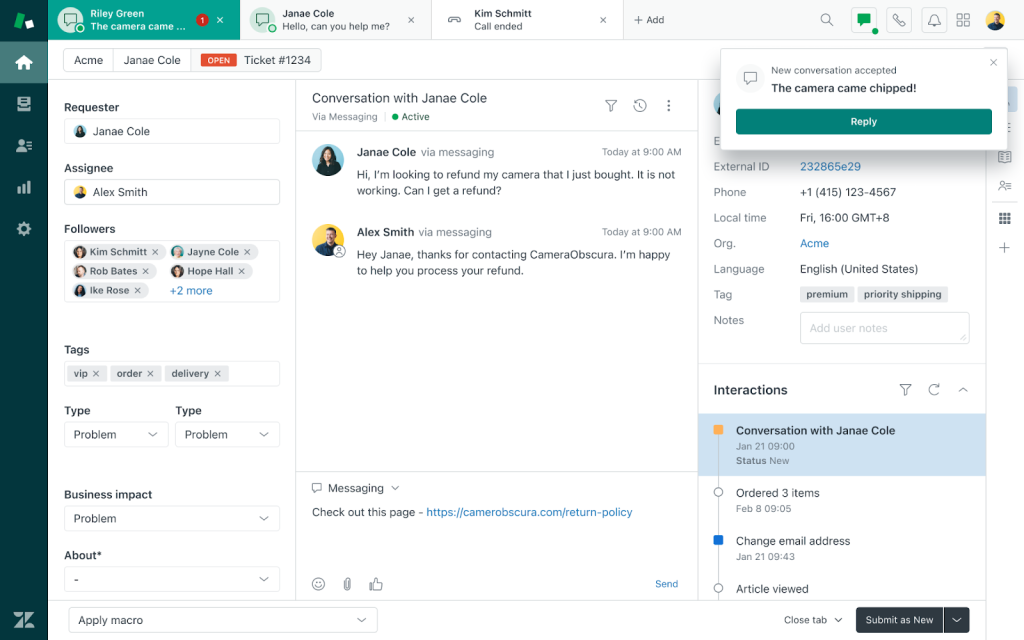
Zendesk is a powerful customer service automation software that offers AI-driven features, including automated ticket routing, chatbots for instant responses, and AI-powered knowledge base suggestions, which streamline customer interactions. It is ideal for existing users, offering seamless integration with its suite for enhanced support capabilities.
The AI assists in handling routine queries, allowing support agents to focus on complex issues. I love how intuitive the interface is and how easily it integrates with other tools—overall, it helps deliver quick, personalized, and hassle-free support experiences.
Pros:
- Conversation summaries to provide quick overviews of chats
- Auto assist to provide agents with helpful resources
- Ticket summaries to generate concise overviews of issues
- Sentiment analysis to detect customer emotions in interactions
Cons:
- Generating highly specific or customized reports can be challenging
- Some users report occasional slowdowns or glitches
G2 Review:
“I love how easy it is to use Zendesk and how it “effortlessly connects me to other departments to address my concerns through its advanced ticketing system!“
Pricing
Starts at $19/agent/month.
Read Also : Zendesk Alternatives: 10 Best Customer Support Software in 2025
7. Intercom
Best for Omnichannel Platform With Messenger & App
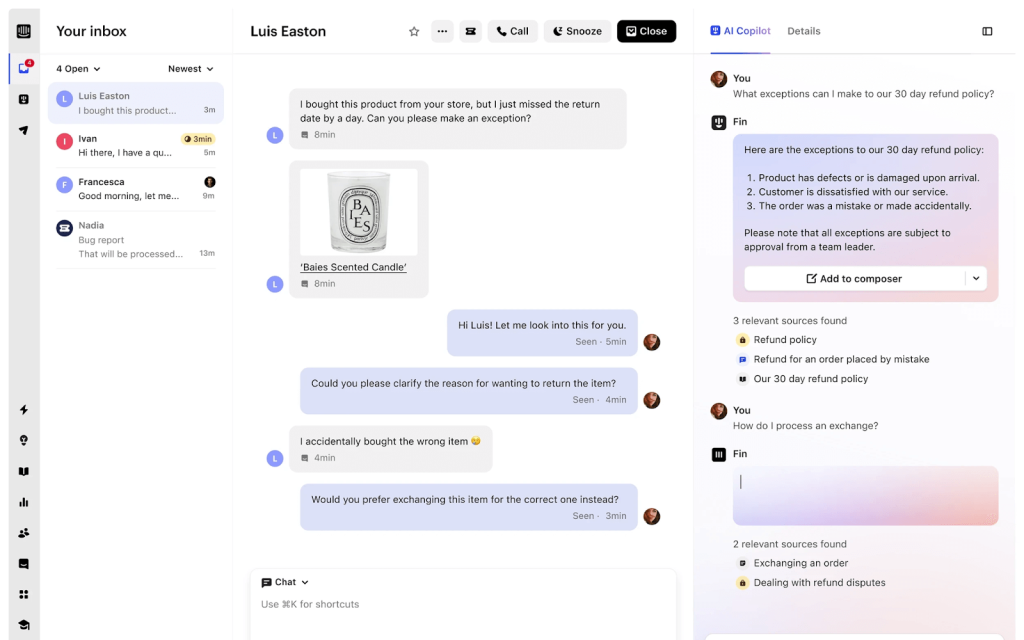
I’ve tried Intercom in the past, and its AI capabilities are impressive. The platform offers advanced AI chatbots that handle queries instantly and route customers to the right agents seamlessly. Ideal for businesses seeking an omnichannel platform, it integrates seamlessly with Messenger and mobile apps for smooth customer interactions.
The automation features, like personalized messaging and real-time support, make interactions smoother and faster. I love how Intercom integrates AI-driven insights to analyze customer behavior, predict trends, and optimize engagement. It’s a robust tool that elevates customer interactions effortlessly.
Pros:
- AI-Powered help center to suggest relevant articles and solutions
- Automated ticketing system to route and categorize customer issues
- Smart routing to direct customers to the right agents
- Custom bots to personalize user interactions with workflows
Cons:
- Limited flexibility in design options
- Can be costly for small businesses
G2 Review:
“Outbound tooling that allows for direct ‘in-context’ communication. The possibilities to give your customer the context/support they need at the point where they need it, allows for a smooth and effortless experience for your end-user. In combination with the omni-support channels, I think it is a very complete product.”
Pricing
Starts at $29/seat/month.
Read Also : Top 16 Intercom Alternatives & Competitors for 2025
8. Live Agent
Best for Ticket Management
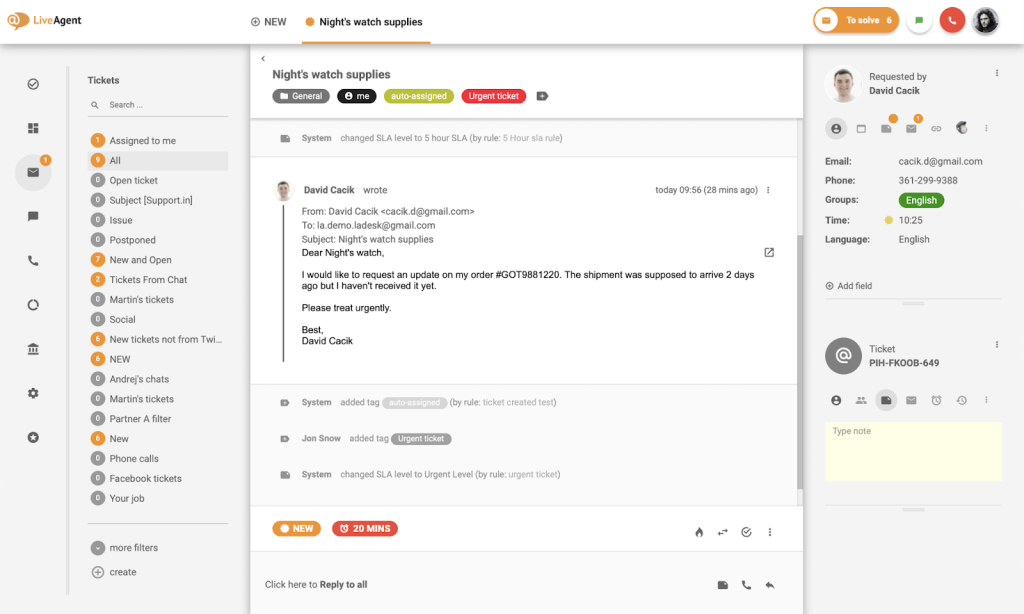
A friend of mine tried LiveAgent for customer service automation, and he was impressed by its advanced ticketing system. The AI ticket management system helped him prioritize and route support requests effortlessly. Plus, the AI chatbots handled customer inquiries smoothly, providing instant and accurate assistance.
The Knowledge Base integration also made it easy for both agents and customers to find relevant information quickly. If you need a streamlined, efficient, and reliable support workflow, LiveAgent is the best option.
Pros:
- AI ticket management to automatically prioritize and route tickets
- AI answer assistant to suggest responses based on queries
- AI whisper assistant to offer real-time suggestions to agents
- Automated ticket tagging to categorize and label tickets automatically
Cons:
- Initial setup and customization can be complex
- Integrating with third-party tools can be tricky
G2 Review:
“LiveAgent enabled us to handle all customer inquiries via live chat with ease. I loved how LiveAgent brought all the sources of inquiries together in one place. I loved the ease of ticket integration, it speeds up the response. I loved the efficiency of LiveAgent documenting notes or comments, it enhanced transparency and commitment to always improving the service.”
Pricing
Starts at $15/agent/month.
Explore : 10 Best LiveAgent Alternatives to Enhance Customer Support 2025
9. Issuetrak
Best for Issue Tracking and Management
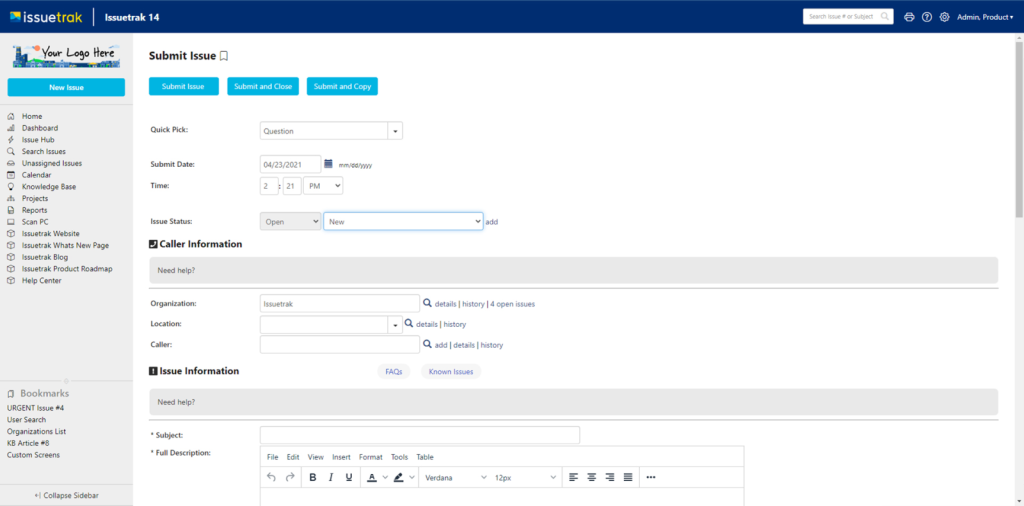
Issuetrak is a robust automation software known for its issue tracking and management. The round-robin Issue Assignment automatically distributes tickets among team members, ensuring balanced workloads. Its task flow feature facilitates collaboration on issues, maintaining consistent processes.
The knowledge base provides a centralized repository for information, enhancing both team and customer support. Overall, Issuetrak’s AI capabilities streamline your support operations, improving efficiency and customer satisfaction.
Pros:
- Omnichannel ticket submission to create tickets via app, email, or webform
- Round Robin issue assignment to automatically distribute tickets among team members
- Task flows to collaborate on issues to ensure process consistency
- Knowledge base to access and manage important information for users and admins
Cons:
- The interface may feel overwhelming for new users
- Customization options can be restrictive, especially for unique workflows
G2 Review:
“Issuetrak is one of the best ticketing systems that I’ve used. The search function for previous tickets is a great Knowledge Base for recurring issues and fixes as long as the tickets are documented properly.”
Pricing
Starts $26/agent/month.
10. NinjaOne
Best for AI-Powered Automation and Remote Monitoring
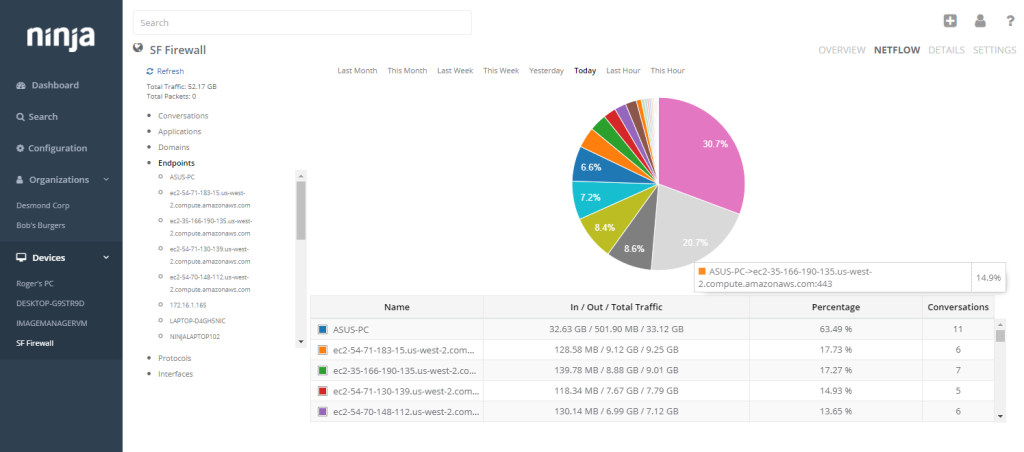
NinjaOne is a comprehensive IT management platform that streamlines remote monitoring, automation, and troubleshooting. The platform’s AI-powered automation helps align routine IT tasks like ticket management and monitoring, reducing manual effort.
Its predictive analytics also provide valuable insights, helping you address potential issues before they escalate. Plus, the real-time alerts and incident detection feature make response times much faster. In my opinion, its the best option to improve customer service efficiency and IT management.
Pros:
- Incident detection to identify and address issues promptly
- Automated remediation to resolve common IT problems automatically
- Anomaly detection to detect unusual system behaviors
- Resource optimization to allocate resources based on usage patterns
Cons:
- Some users report occasional slowdowns or glitches
- The mobile app may lack some functionalities available on the desktop version
G2 Review:
“NinjaOne helps our IT Department automate various operations. The integrated ecosystem, including the Ticket System and Remote Control, allows us to provide the best support experience. We particularly appreciate the automation, patch management, and customer support, which contribute to the success of using NinjaOne. The application is very easy of use and the implementation and the Integration was very elementary. We have finished the startup and golive in very short time. Congrats”
Pricing
Contact the sales team.
11. Stonly
Best for AI-Powered Guided Support
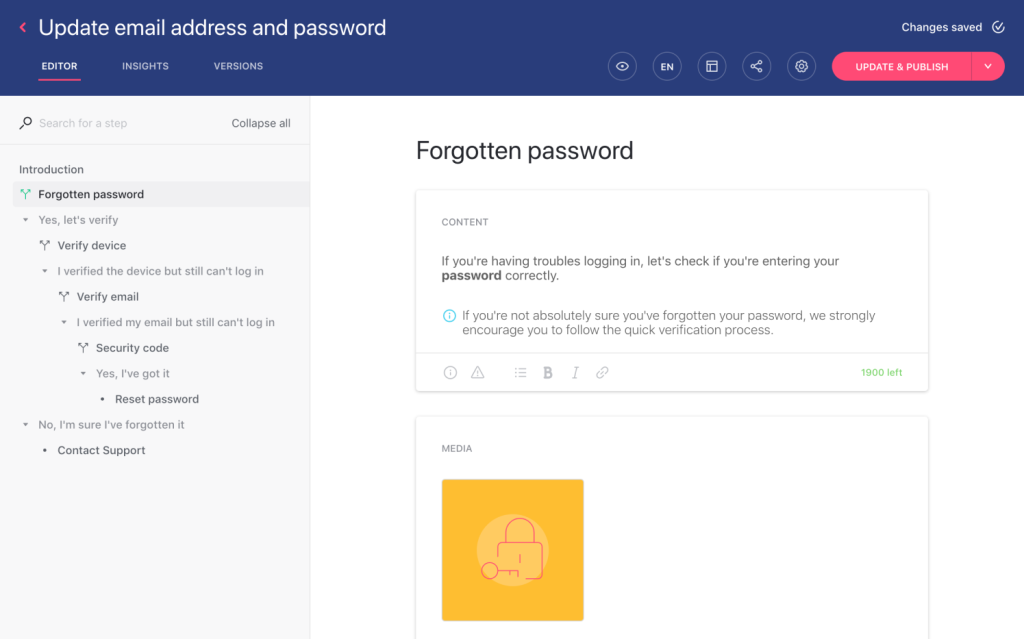
Stonly is a knowledge management platform that offers AI-driven guided support, helping businesses create interactive and intelligent troubleshooting experiences for customers. I like how it analyzes customer behavior and context to deliver the most relevant help articles and guides, ensuring users receive timely and accurate information.
Plus, its AI-driven chatbots offer intelligent, engaging interactions, guiding customers to effective solutions with a human-like touch. It simplifies knowledge base creation with AI, helping build effective guides quickly, ensuring consistent and high-quality support for businesses.
Pros:
- Automated guide creation to assist in building knowledge resources
- User behavior analysis to Identify patterns for improvement
- Contextual support to deliver help within the user’s workflow
- Optimized search to improve search accuracy
Cons:
- Some users have reported occasional delays in receiving support
- Building complex interactive guides may require some training
G2 Review:
“The most helpful thing about Stonly is how incredibly user friendly it is. We use it frequently at work to update and keep our partners and customers up to date with our informaton. There are plenty of ways to customize the look with different media types and ways to upload our information. I also enjoy the breadcrumbs along the top of each page. Our team has many different guides uploaded, so it’s nice to know exactly where we are. Stonly hasn’t let us down, and the communication with insights and updates from the Stonly team are nice.”
Pricing
Contact the sales team.
12. Front
Best for AI-powered Inbox Management
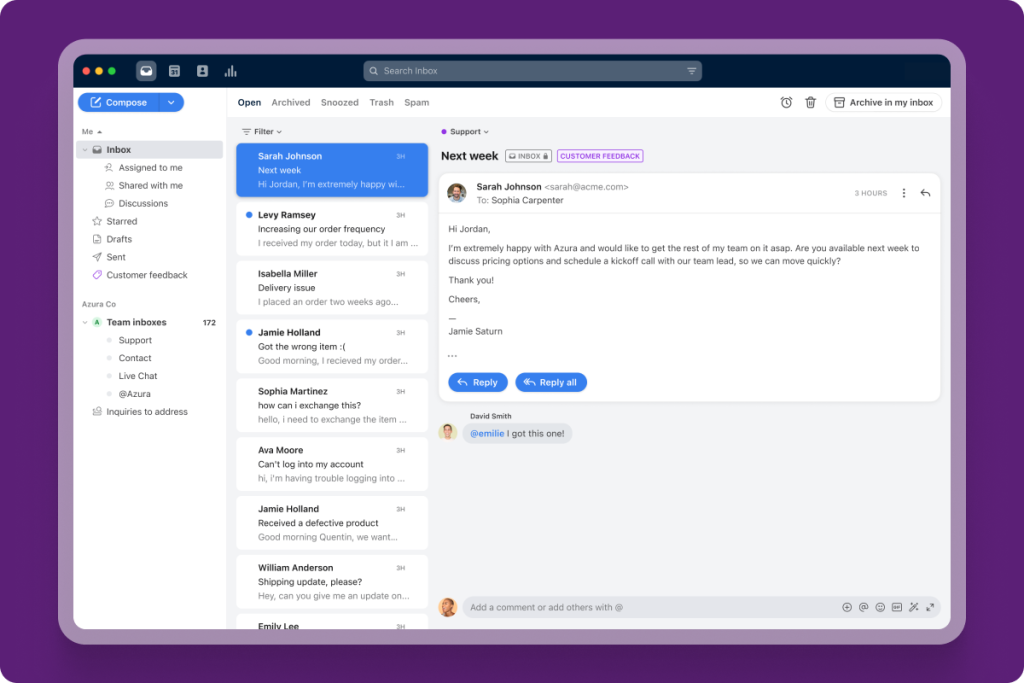
Front is a fantastic customer service automation software that streamlines communication and boosts team efficiency. It uses AI to intelligently organize and prioritize messages, helping teams collaborate more efficiently and respond faster to customers.
I like its AI features like automated routing, smart replies, and sentiment analysis save time and improve response quality. Plus, the platform’s collaborative tools enable seamless teamwork and knowledge sharing. With its intuitive interface and robust features, Front empowers businesses to deliver exceptional customer experiences.
Pros:
- Similar conversations to identify past conversations to provide context
- AI Tagging to automatically tag conversations for improved organization
- Automated routing to direct inquiries to the right agent
- Performance insights to identify areas for agent improvement
Cons:
- Integrations with certain third-party apps might be limited
- Complex setups can be time-consuming
G2 Review:
“I like the efficiency front provide us whenever we start the shift and it starts to assigned us the udpates we need to work in , that awesome because sometime we can forget to check some emails to get updates but with this option from front we can get the updates automaticaly on the cases we need to sorted out urgently, so it is really easy to work , efficient and innovative app.”
Pricing
Starts at $19/seat/month.
13. Kommunicate
Best for AI-powered Chatbots
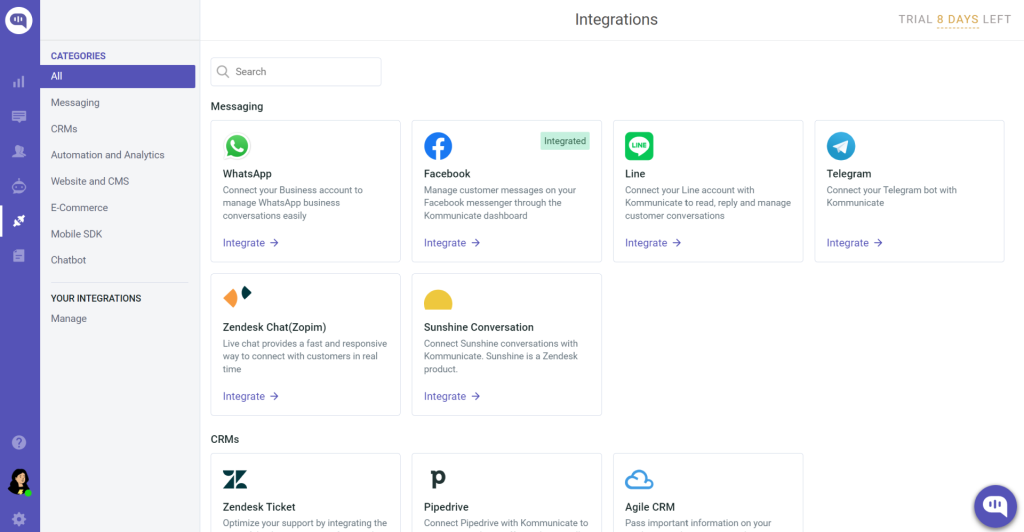
Kommunicate is known for its AI-powered chatbots. Its AI chatbot solves common queries instantly, freeing up human agents for complex issues. Plus the seamles integration with popular messaging channels like WhatsApp,and Slack, provides a unified platform for customer interactions.
I love how the platform’s intelligent routing ensures tickets are assigned efficiently, making support smoother. Its insightful analytics help you track key performance metrics effortlessly. Its user-friendly interface and comprehensive features help you deliver exceptional customer support experiences every single time.
Pros:
- Omnichannel messaging to support communication across multiple platforms
- Ticketing system to manage and track customer issues
- Automated workflows to streamline repetitive tasks and processes
- AI-powered knowledge base to deliver instant information to customers
Cons:
- Users may experience minor performance issues or bugs
- The pricing may be on the higher side for small businesses or startups
G2 Review:
“As a coding newbie, I was thrilled with how easy Kommunicate’s AI chatbot was to set up. It was intuitive and straightforward, letting me launch a website chatbot without breaking a sweat.”
Pricing
Starts at $100/month.
Explore : 11 Kommunicate Alternatives for Customer Support Automation in 2025
14. BotsCrew
Best for Seamless Multi-channel Customer Service
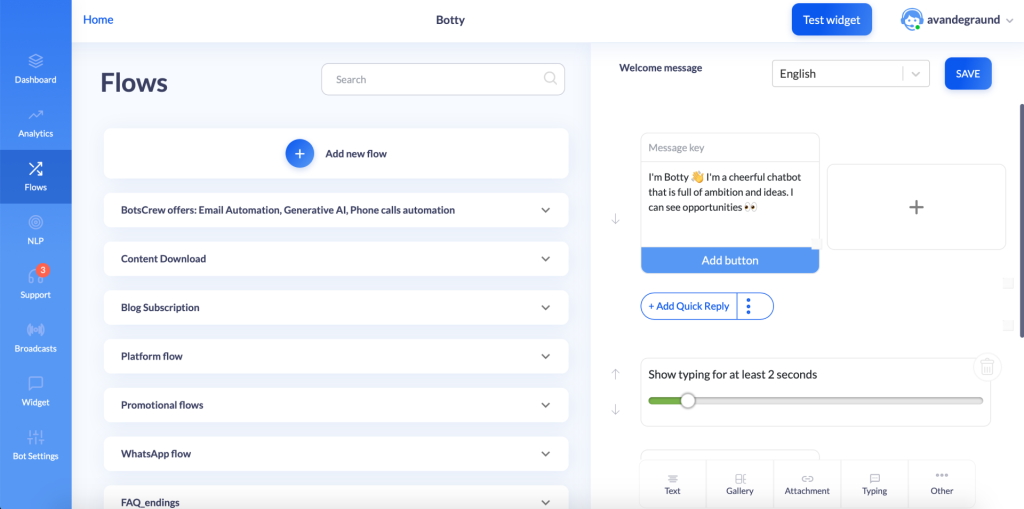
BotsCrew is a powerful platform for building AI-driven chatbots that offer seamless multi-channel customer service. The platform’s chatbot creation tools are easy to use, making it simple to build personalized solutions. It offers advanced sentiment analysis, allowing chatbots to gauge customer emotions and tailor responses accordingly.
I’ve experienced how BotsCrew integrates seamlessly with various messaging channels and CRM systems, making customer support much more efficient. It takes care of various tasks, helping me improve productivity while enhancing the customer experience.
Pros:
- AI chatbot to automate customer support interactions
- Predictive analytics to anticipate user needs based on patterns
- Multi-language support to provides assistance in multiple languages
- Task automation to automate repetitive tasks and workflows
Cons:
- Reporting capabilities may be basic
- Some features have limited customization
G2 Review:
“My company hired BotsCrew to create their personalized Customer Service chat, the process was seamless, quick and I like that you can select different languages, very professional If I compare with others”
Pricing
Contact the sales team
Read Now : 10 Best BotsCrew Alternatives and Competitors in 2025
15. Zoho Desk
Best for Zoho Suite Users
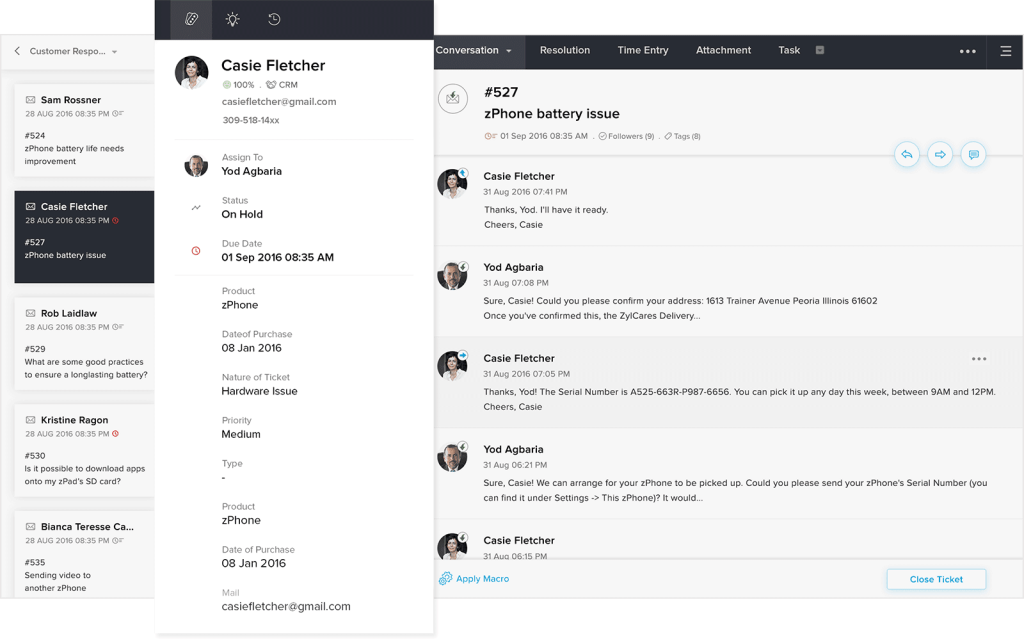
Zoho Desk is a robust customer service automation software that empowers businesses to deliver exceptional support experiences. Ideal for Zoho Suite users, Zoho Desk integrates effortlessly with other Zoho apps to enhance your support operations.
Its AI-powered features, like Zia, a smart virtual assistant, automate tasks, provide intelligent suggestions, and analyze customer sentiments. Zoho Desk’s omnichannel capabilities help me unify customer interactions across different channels, making it easier to manage. I also love how its self-service portal lets customers find solutions on their own. The platform’s workflow automation has been a game-changer, streamlining processes and boosting agent productivity.
Pros:
- Response suggestions to recommend replies to customer queries
- Ticket tagging to automatically categorize and prioritize tickets
- Assignee prediction to predict the best agent for a ticket
- Answer bot to provide instant answers to common questions
Cons:
- Can be overwhelming for beginners due to its extensive features
- The mobile app may lack some desktop functionality
G2 Review:
“Zoho Desk is a feature-rich customer support tool that offers a solution to our needs for a support ticketing system. It also includes an online support portal, options for live chat, self-service and the ability to integrate with their CRM solution.”
Pricing
Starts at $7/month.
Also Read : 10 Best Zoho Desk Alternatives and Competitors
16. SleekFlow
Best for Integrated Messaging
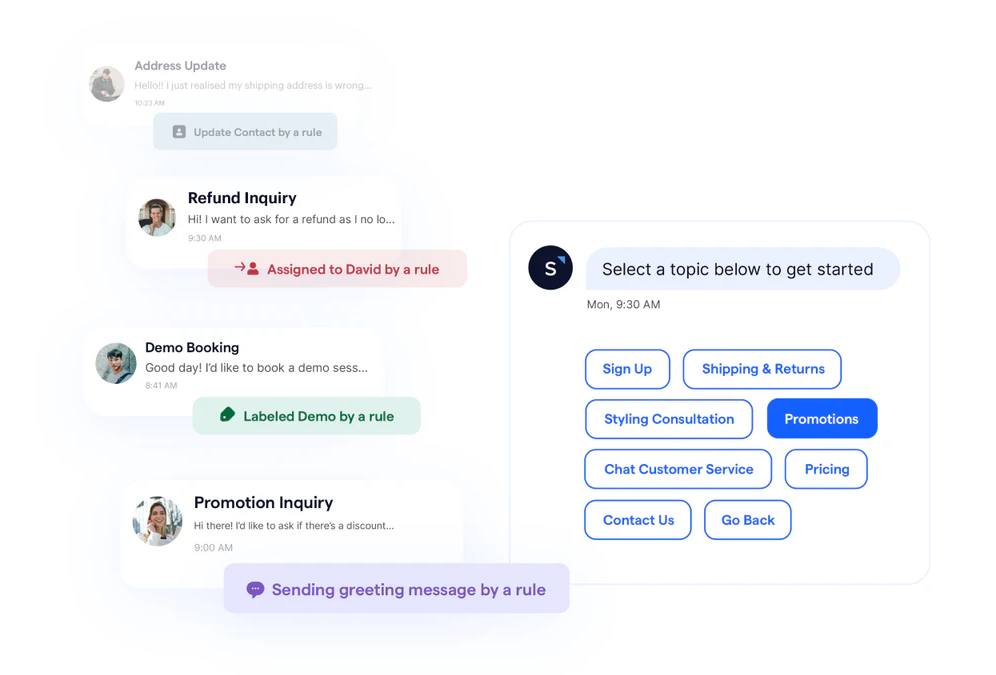
SleekFlow is a robust customer service automation software that streamlines communication across multiple channels, including WhatsApp, Facebook, and more. I find the AI-powered features, such as automated responses and smart routing, incredibly helpful in managing customer queries efficiently. It also offers advanced features like sentiment analysis, which helps detect customer emotions for more personalized responses.
Plus, SleekFlow’s live chat integration and analytics offer real-time support and valuable insights. Overall, it’s a powerful tool for businesses looking to improve their customer service with automation and AI.
Pros:
- Sales automation to qualify leads and automate sales processes
- Workflow automation to streamline tasks and improve team efficiency
- Integrated CRM to provide a centralized view of customer data
- In-depth analytics to track key metrics and measure campaign performance
Cons:
- Requires time to master all features and functionalities
- Like any software, occasional bugs or glitches may occur
G2 Review:
“It’s pretty easy, and straight forward to work with. Everything works as supposed to work. Their support is fast to respond, and will help you all the way. Overall everything works so far, and it’s good to work with.”
Pricing
Starts at $146.90/month.
Related : Top 10 SleekFlow Alternatives to Engage & Support Customers in 2025
17. Kayako
Best for Help Desk Integration
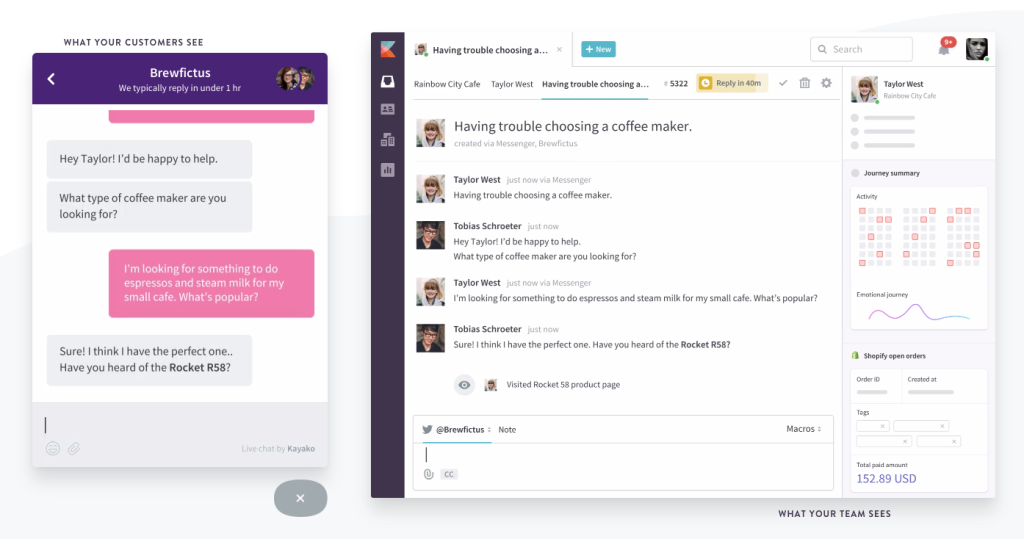
Kayako is a comprehensive customer service platform that streamlines support with multi-channel integration, including email, live chat, and social media. I find Kayako perfect for help desk integration, as it easily connects with multiple platforms to streamline customer support and ticket management.
Its AI-powered features, like automated ticket routing and smart responses, enhance customer interactions by providing quick and accurate solutions. I like its user-friendly interface which ensures smooth collaboration among teams. While its pricing may be a bit high for small businesses, it’s an excellent choice for organizations seeking to optimize customer service and deliver a seamless support experience.
Pros:
- Smart replies to suggest relevant responses to agents
- Self-service portal to empower customers to find answers independently
- Smart ticket routing to direct inquiries to the appropriate agent.
- Automated tagging to categorize and prioritize conversations
Cons:
- May not integrate with all desired systems
- Complex setups can be time-consuming
G2 Review:
“Easy to assign tickets and inter department changes are also really smooth. The options for adding followup notes for tickets saves a lot of time as there is no need to pass updates through other means such as vocal or messages.”
Pricing
Starts at $49/month.
Related : Top 15 Kayako Alternatives & Competitors in 2025
18. RingCentral
Best for Smart Call Routing & Transcription
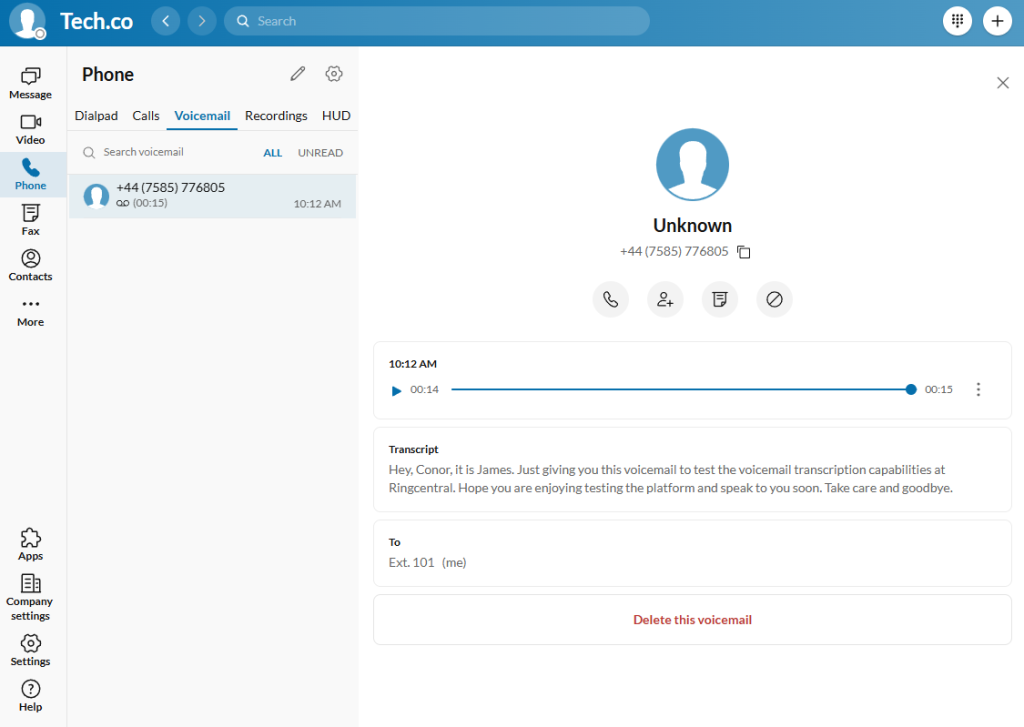
RingCentral offers cloud-based communication and collaboration solutions that improve business productivity and efficiency. It leverages advanced AI to automate call routing and provide real-time transcription. I like its AI features, such as live transcription, noise reduction, and meeting summaries, streamline workflows and improve communication quality.
RingCentral’s unified platform integrates team messaging, video conferencing, and phone calls, enabling seamless collaboration across various channels. With its robust features and user-friendly interface, RingCentral empowers businesses to connect effectively, improve customer interactions, and drive growth.
Pros:
- Meeting summaries to automatically generate summaries of key discussion points
- Voicemail transcription to transcribe voicemails to text for easy review
- Sentiment analysis to detect emotions in customer interactions
- Automated attendant to provide intelligent call routing and self-service options
Cons:
- The mobile app may lack some desktop functionality
- Relies on a stable internet connection for optimal performance
G2 Review:
“It’s versatile and can be used in a multitude of ways, across multiple devices, that all correspond to the same phone number extension. It makes answering office calls while traveling or working remotely pretty easy.”
Pricing
Contact the sales team.
19. Trengo
Best for AI-powered Messaging Automation
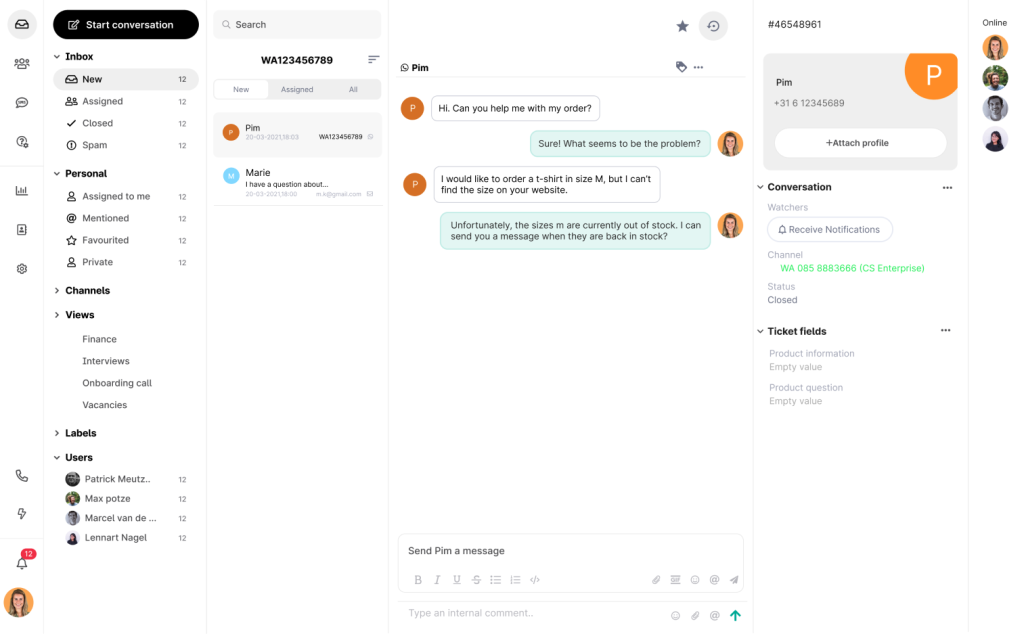
Trengo is a versatile customer service platform that streamlines communication with intelligent automation across various channels, enhancing efficiency and customer experience. I’m impressed by its features, including automated replies and smart routing, which help teams respond faster and more efficiently.
Trengo also offers collaboration tools, allowing teams to work seamlessly together on tickets and inquiries. With detailed analytics and reporting, businesses can gain valuable insights into their support performance. Trengo is the best choice for businesses looking to streamline customer support operations.
Pros:
- Ticket tagging to categorize and prioritize conversations
- Knowledge base integration to suggest relevant articles to agents and customers
- Analytics and reporting to track key metrics and identify areas for improvement
- Workflow automation to automate repetitive tasks and processes
Cons:
- Advanced customization options might be restricted
- Integrating with some third-party apps may be difficult
G2 Review:
“For our administration staff, Trengo is a great tool to combine the different old email channels after the rebranding. The onboarding procedure was good and Charlotte was always willing to help us with any question or issue.”
Pricing
Starts at 129.67/month.
Read Now : 10 Best Trengo Alternatives to Boost Your Engagement in 2025
20. Comm100
Best for Omnichannel Customer Communication
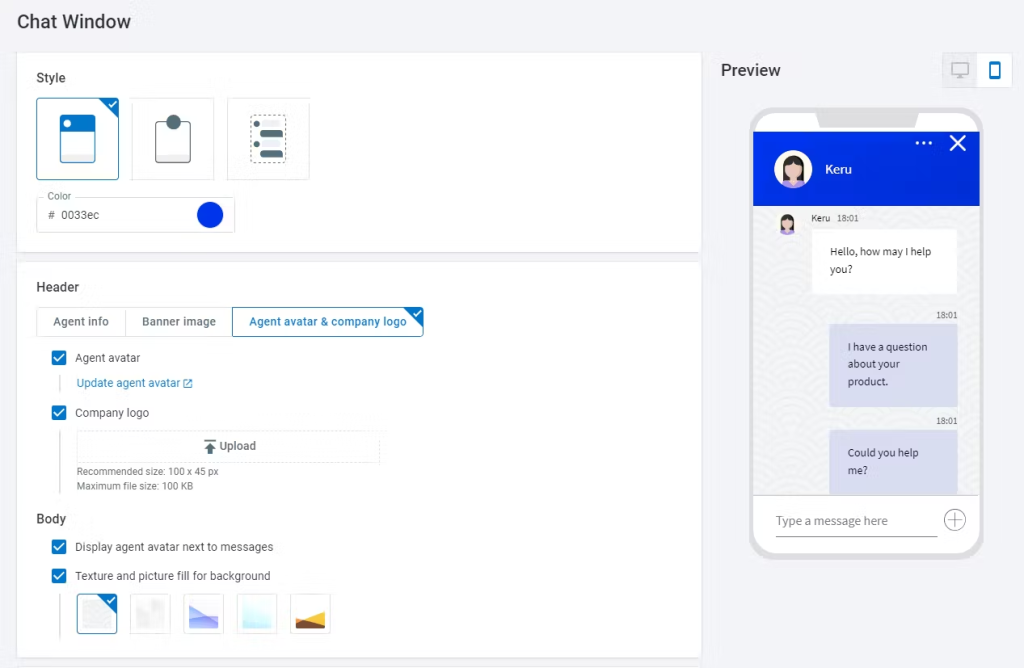
Comm100 is a powerful customer service platform that leverages AI to enhance support operations. With multi-channel support, including live chat, email, and social media, it offers a seamless experience for both customers and support teams. I love how its AI-powered chatbot provides instant automated responses.
Comm100 also includes advanced features like sentiment analysis, which helps deliver more personalized responses. It’s a great solution for businesses looking to streamline customer service and enhance efficiency with the power of AI innovation.
Pros:
- Chatbot with generative AI to provide dynamic and human-like conversations
- Automated routing to direct inquiries to the most suitable agent
- Live chat to initiate conversations with website visitors
- Ticket tagging to automatically categorize and prioritize tickets
Cons:
- Higher-tier plans with advanced AI features can be expensive
- The platform’s extensive features may require a learning curve
G2 Review:
“Very intuitive and easy to set up, simple but accurate reporting.”
Pricing
Starts at $31/ agent/month.
Read Also : 10 Best Comm100 Alternatives to Boost Your Engagement in 2025
Why Invest in Customer Service Automation Software?
Investing in customer service automation tools empowers businesses to deliver exceptional support experiences while maximizing efficiency and scalability. Here are the five major benefits of investing in customer service automation software.
24/7 Customer Support
Automation tools, such as chatbots and self-service portals, ensure that customers receive instant support at any time, even outside business hours. This continuous availability means that customers don’t have to wait long to get answers or resolve issues, fostering trust and loyalty.
The ability to provide 24/7 support also boosts satisfaction and retention rates, as customers appreciate businesses that prioritize their needs around the clock.
Scalability of Support Operations
Customer service automation enables businesses to scale their support operations effortlessly without the need to hire more staff during peak seasons or high-demand periods. With tools that handle a large volume of interactions simultaneously, companies can accommodate more customers efficiently while keeping costs under control.
This scalability ensures that service levels remain high even as the business grows, providing a consistent and seamless experience.
Improved Response Times
With automated tools handling routine queries and AI-driven chatbots addressing common concerns, response times are significantly reduced. Faster responses mean that customers experience less frustration and get their issues resolved quicker.
As a result, this rapid interaction positively impacts customer satisfaction and loyalty, reinforcing the perception of a reliable and attentive business.
Data-Driven Insights
Automation software captures and analyzes large amounts of customer interaction data, offering valuable insights into purchasing patterns, preferences, and pain points. This data helps businesses make strategic decisions about product offerings, marketing strategies, and customer engagement tactics.
By understanding customer behavior and trends, businesses can personalize interactions, predict customer needs, and deliver solutions that improve the overall customer experience.
Reduced Human Error
Automating customer service tasks minimizes the risk of human mistakes, ensuring that responses are consistent, accurate, and reliable. Whether it’s updating customer information, responding to inquiries, or resolving issues, automated systems maintain a high level of accuracy and service quality.
This consistency strengthens the brand’s reputation, boosts customer trust, and ensures that interactions reflect professionalism and attention to detail.
What are the Different Types of Customer Service Automation Tools?
Automating customer service processes can boost efficiency and ensure consistent support experiences. Here are the various types of automation tools that can elevate your customer service game.
1. Chatbots
Chatbots are AI-powered tools that handle customer interactions around the clock, providing instant responses and efficiently addressing common inquiries. They can be deployed on websites, social media platforms, and messaging apps.
Chatbots automate tasks such as answering FAQs, processing orders, troubleshooting issues, and guiding customers through product features.
With machine learning, they continuously improve their responses and accuracy, ensuring a seamless customer experience.
2. Helpdesk Software
Helpdesk software is a central tool for managing customer support tickets. It automates the ticket lifecycle, prioritizing incoming requests and assigning them to the right agents based on factors like expertise, availability, and urgency.
These tools often include features like automated responses, escalation workflows, integration with knowledge bases, and performance analytics.
A well-implemented helpdesk system minimizes resolution time, boosts productivity, and ensures that customer issues are addressed efficiently and professionally.
3. Live Chat Software
Live chat tools offer real-time interaction between customers and support agents but can also incorporate automation to enhance functionality. For example, pre-chat forms can collect information before a conversation, automated greetings can acknowledge visitors, and AI routing can direct queries to the appropriate department or specialist.
These features complement human interaction by ensuring quick response times, reducing wait times, and offering context-aware support.
4. Email Automation
Email automation tools help businesses manage large volumes of customer communications efficiently. They automate tasks such as sending confirmation emails, follow-ups, support responses, and personalized marketing campaigns.
These tools often feature templates, scheduling, and workflow automation. With advanced email analytics and tracking, businesses can measure engagement, improve response times, and maintain consistent communication with customers while ensuring a personalized experience.
5. Self-Service Portals
Self-service portals empower customers to find answers and resolve issues independently, without needing direct support interactions. These portals often include features like FAQs, step-by-step guides, video tutorials, and knowledge articles.
Automation tools in self-service portals allow customers to reset passwords, track orders, process returns, and find troubleshooting steps.
This approach improves customer satisfaction by providing instant support and reducing the need for human intervention.
6. Social Media Automation
Social media automation tools streamline customer interactions across platforms like Facebook, Twitter, Instagram, and LinkedIn. These tools automatically monitor interactions, post updates, and provide instant responses to comments and direct messages.
Automation also includes sentiment analysis and social listening, which helps businesses address customer concerns quickly and efficiently.
With these tools, businesses can maintain brand consistency, improve engagement, and ensure that customer interactions on social channels are timely and meaningful.
7. CRM Automation (Customer Relationship Management)
CRM software is designed to centralize customer interactions, automate data tracking, and streamline communication. With CRM automation, businesses can segment customers, personalize interactions, and send automated follow-ups or reminders.
Features often include lead tracking, sales pipeline automation, reporting dashboards, and integration with other tools like email, chat, and social media.
This ensures that every interaction is informed and data-driven, leading to better customer relationships, higher retention rates, and increased sales opportunities.
FREE. All Features. FOREVER!
Try our Forever FREE account with all premium features!
How to Choose the Right Customer Support Automation Software for Your Business
Choosing the right customer support automation software is crucial for streamlining operations and enhancing customer satisfaction. With the wide range of options available, consider these practical factors to make an informed decision:
Scalability
It’s essential to select a solution that can easily scale with your business as it grows. The software should be able to handle increasing volumes of customer inquiries, adapting to your expanding team, customer base, and support requirements over time without compromising performance or response times.
Integration Capabilities
The ideal customer support automation software should integrate seamlessly with your existing systems, such as CRMs, email marketing platforms, and helpdesk tools. This ensures smooth data transfer, prevents duplicate entries, and allows for a more unified experience across different departments.
Customization Options
A good software solution should offer flexibility to customize workflows, automated responses, and user interfaces to align with your company’s branding, tone, and customer expectations. The ability to personalize the system based on your unique needs will result in a more tailored and efficient support experience.
AI and Automation Features
The use of AI-powered tools, such as intelligent chatbots and automated response systems, can significantly enhance your customer support. Look for software that uses advanced natural language processing (NLP) to provide accurate and timely answers, reducing human intervention and improving customer satisfaction.
User-Friendliness
Choose software with an intuitive and easy-to-navigate interface for both your support agents and customers. A user-friendly system will reduce the learning curve for your team, improve productivity, and lead to a smoother experience for your customers seeking help.
Analytics and Reporting
Opt for software that provides comprehensive analytics and reporting tools. These features allow you to track key performance metrics, such as response times, customer satisfaction levels, and issue resolution rates, helping you make data-driven decisions to continuously improve your customer support processes.
What are some Examples of Customer Service Automation?
Customer service automation is reshaping the way businesses interact with customers, making support faster, smarter, and more efficient. Here are five customer service automation examples that showcase its incredible potential:
1. AI-Powered Chatbots
Imagine a customer landing on your website with a simple question about shipping costs. Instead of waiting for an email response or navigating FAQs, an AI chatbot instantly pops up to provide the answer. These chatbots can handle a wide range of common queries, freeing up your human agents to focus on more complex issues. This leads to faster response times, increased customer satisfaction, and improved efficiency.
2. Automated Ticket Routing
A customer submits a support ticket about a technical issue. Instead of landing in a general inbox, AI-powered routing automatically analyzes the ticket’s content and assigns it to the agent with the right expertise. This ensures that issues are resolved quickly and efficiently by the most qualified person, minimizing customer frustration and improving first-call resolution rates.
3. Personalized Self-Service
A customer wants to reset their password. Instead of contacting support, they visit your website’s help center. AI-powered search functionality guides them to the exact information they need, personalized based on their account history and previous interactions. This empowers customers to find solutions independently, reducing support tickets and improving overall satisfaction.
4. Proactive Customer Outreach
A customer abandons their online shopping cart. An automated email triggered by AI reaches out to them, offering assistance or a discount code to encourage them to complete their purchase. This proactive approach can recover lost sales and demonstrate that you care about your customers’ needs.
5. Sentiment Analysis for Improved Support
A customer expresses frustration in a support email. AI-powered sentiment analysis detects the negative tone and flags the ticket for immediate attention. This allows your team to prioritize urgent issues and respond with empathy, potentially de-escalating situations and improving customer loyalty.
What are the Key Trends in Customer Service Automation Software for 2025?
As we approach 2025, customer service automation software is evolving rapidly to meet customer demands and expectations. Here are six key trends shaping the future of customer service automation:
AI-Powered Self-Service Solutions
Customers are increasingly looking for fast, efficient resolutions without waiting for human assistance. AI-driven chatbots and virtual assistants will continue to dominate, providing 24/7 support for common queries, reducing waiting times, and allowing businesses to handle more customer interactions at once. These tools will not only automate responses but also improve over time, offering more accurate and relevant solutions.
Omnichannel Integration
With customers engaging through a variety of channels, businesses will focus on creating a seamless omnichannel experience. Automation platforms will allow customers to start a conversation on one platform—like social media—and continue it on another, such as email or live chat, without losing context. This level of integration will improve customer satisfaction by providing a consistent and fluid experience, regardless of the communication method.
Personalization Through Data Analytics
The future of customer service automation will be heavily influenced by data analytics. AI will analyze customer behavior and interaction history to provide personalized solutions and recommendations. This means businesses will be able to offer relevant offers, product recommendations, and even anticipate customer needs, improving customer loyalty and satisfaction by making each interaction feel uniquely tailored to the individual.
Automated Sentiment Analysis
As automation tools become more sophisticated, sentiment analysis will be a key component in improving customer service interactions. By analyzing tone, keywords, and customer feedback, AI systems will be able to gauge customer emotions and respond accordingly. This will allow businesses to adapt their communication strategies in real-time, ensuring that angry or frustrated customers are given more empathy and assistance, leading to better customer retention.
Voice Recognition Advancements
Advances in voice recognition technology will significantly enhance customer service automation, making voice interactions more intuitive and efficient. With improved accuracy in understanding natural speech, voice assistants will be able to handle complex customer queries and tasks without requiring customers to navigate cumbersome menus. This trend will provide customers with a more natural and satisfying experience when seeking support, whether through smart speakers or phone calls.
Proactive Customer Service
Moving from reactive to proactive service will be a major shift in 2025. Automation tools will not just wait for customers to report issues but will actively notify them of potential problems, updates, or service disruptions. For example, AI could alert a customer about a delivery delay or provide troubleshooting tips before they experience an issue, leading to higher customer satisfaction and fewer incoming support requests.
Evaluation Criteria
The selected tools are evaluated based on key factors to ensure they effectively meet business needs. Here are the main criteria used in the assessment:
1. Ease of Use
How intuitive is the interface? Does the tool require a steep learning curve, or is it accessible for users of all skill levels?
2. Features and Functionality
What essential features does the tool offer? Are they comprehensive and aligned with user needs, such as automation, customization, or integrations?
3. Performance and Reliability
How well does the tool perform under typical and peak usage? Is it dependable with minimal downtime or issues?
4. Customer Support
What level of support is offered? Is it responsive and available across multiple channels like chat, email, or phone?
5. Pricing and Value for Money
How does the tool’s pricing compare to its features? Is it cost-effective for small businesses or better suited for larger organizations with bigger budgets?
6. Scalability
Can the tool scale with business growth? Does it offer flexibility to expand its features or support more users without sacrificing performance?
FREE. All Features. FOREVER!
Try our Forever FREE account with all premium features!
Level up Your Support Game With Customer Service Automation
Today, exceptional customer service is paramount to success. By opting for automation in customer service, businesses can streamline their support processes, reduce response times, and elevate customer satisfaction. From AI-powered chatbots to self-service portals, these tools empower businesses to optimize their support operations.
When selecting the right software, consider factors like your team size, communication channels, and desired level of automation. Prioritize seamless integrations with your existing systems and ensure the chosen solution offers scalability to accommodate future growth.
For a comprehensive and user-friendly solution, try ProProfs Chat. With its AI-powered chatbots, live chat capabilities, and robust automation features such as automated chat routing and online visitor tracking, ProProfs Chat empowers you to deliver exceptional support experiences, boost agent productivity, and drive customer loyalty.
Learn More About Customer Service Automation Software: FAQs
How do you know if your automated customer service is working?
To determine if your automated customer service is working, monitor key metrics such as response time, resolution time, customer satisfaction scores, and the number of support tickets escalated to human agents. If automation is effectively resolving inquiries, these metrics should show improvement and a reduction in overall support workload.
Why should you prioritize automating customer service?
Prioritizing automation in customer service helps businesses enhance efficiency, reduce operational costs, and provide 24/7 support. It also allows for scalability, ensuring that customer inquiries are managed quickly and accurately, even during peak times, leading to higher customer satisfaction and improved overall service delivery.
 Tips
Tips
We’d love to hear your tips & suggestions on this article!
FREE. All Features. FOREVER!
Try our Forever FREE account with all premium features!


 We'd love your feedback!
We'd love your feedback! Thanks for your feedback!
Thanks for your feedback!


